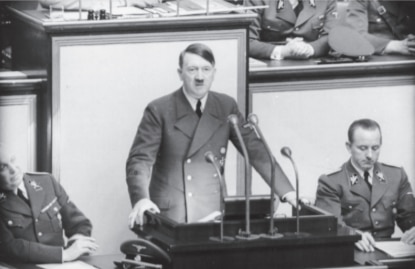Rumana Ashraf, Medical Student, USA

Morality: a term used to define the principle behind the distinction between right and wrong, has been at the forefront of the basic teaching of most religions since the early ages of human existence.
From distinguishing what actions are considered right and wrong to justifying wrong actions with the right intentions, morality is a concept that has been stretched, twisted and moulded to accommodate all perspectives of thinking.
Evidently, there have been countless individuals such as Mussolini, Joseph Stalin and Adolf Hitler who attempted to justify their actions as being “right”. Dictators and tyrants like them and others have used politics and religion to solidify their beliefs. Objectively speaking, is there scientific evidence that can challenge those who believe that what is considered right and wrong is a subjective matter?
According to the Holy Quran, there is a part of the human anatomy that correlates directly to the idea of morality. There is a region in the brain called the prefrontal cortex that is responsible for certain actions relating to thinking, planning and impulse inhibition. In essence, this region of the brain is physically capable of distinguishing actions that are wrong versus right.
اَلَمۡ يَعۡلَمۡ بِاَنَّ اللّٰهَ يَرٰی
كَلَّا لَئِنۡ لَّمۡ يَنۡتَهِ ۬ لَنَسۡفَعًۢا بِالنَّاصِيَةِ
نَاصِيَةٍ كَاذِبَةٍ خَاطِئَةٍ
“Does he not know that Allah sees [him]? Nay, if he desists not, We will assuredly [seizeand] drag him by the forelock. A forelock, lying, sinful.” (Surah al-Alaq, Ch.96: V.15-17)
Here, the Holy Quran directly relates the forelock with the action of lying. Looking closer into this verse, we can infer that the Holy Quran is referencing the prefrontal cortex (forehead) of the human anatomy with this action. Scientists have concluded that the front of the brain, the same area to which the Holy Quran is referring, is associated with actions relating to cognitive action and functional control. Research has shown that when someone lies, the prefrontal cortex becomes active in trying to work with the action of deceiving and interpreting moral cognition.
“Humans daily face social situations involving conflicts between competing moral decisions. Despite a substantial amount of studies published over the past 10 years, the respective role of emotions and reason, their possible interaction, and their behavioural expression during moral evaluation remains an unresolved issue. A dualistic approach to moral evaluation proposes that the right dorsolateral prefrontal cortex (rDLPFc) controls emotional impulses. However, recent findings raise the possibility that the right DLPFc processes emotional information during moral decision making […] Overall, our results suggest that the rDLPFc (Dorsolateral Prefrontal Cortex), most likely in combination with other brain structures, integrates complex secondary emotions generated by contextual information knowledge that are decisive for response selection in moral judgements.” (Social Cognitive and Affective Neuroscience, Vol. 7, Issue 3, March 2012, pp. 282–288, https://doi.org/10.1093/scan/nsr008)
In essence, as science and technology advance our understanding of the scientific aspect of morality further, existing evidence becomes supported by new research proving that morality is in fact – to a degree – an objective matter.
The Holy Quran states:
فَاَلۡهَمَهَا فُجُوۡرَهَا وَ تَقۡوٰهَا
“And He revealed to it the ways of evil and the ways of righteousness” (Surah al-Shams, Ch.91: V.9)
Going back to our original question having understood this scientific principle of morality: Why did Hitler believe what he was doing was right, despite the Holy Quran (and science) proving otherwise?
The simple truth, he could not have truly believed in the morality of his actions.
Regardless of how many times Hitler spoke to the public about truth, justice and divinity, historically speaking, his actions in private were different. Despite having advocated and worked for his “Aryan race,” Adolf Hitler committed suicide on 30 April 1945, after having been notified of the advancement of Allied Forces throughout Germany. It is important to understand that a man with a clear conscience and true morality has no reason to run or escape from continuing to pursue a cause that is truly noble. However, when an individual who has done wrong is challenged with the fear of punishment, accountability, answerability and trial, a strong motivation to desert the cause, commitment and ultimately life can become what seems like the last and only option.
Additionally, as the Allied Forces made their way throughout Germany to liberate camps, German officials commanded for the destruction of all evidence relating to the imprisonment and persecution of Jews. Documents were hastily burned, records destroyed and prisoners rapidly shuffled out of camps and into new secret locations in an attempt to conceal any and all proof of wrongdoing the Allied Forces could find on arrival. However, only so much evidence could have been concealed so expeditiously; and eventually, the Allied Forces secured an unfathomable amount of evidence.
An additional point can be made here that a man with a sense of truth, integrity and virtue has no reason to frantically rid himself of information relating to his deeds.
Although certain situations may attempt to sway us to cover a truth, stretch a fault, or spin scenarios, there will always be a physical part of our own anatomy that is working to interpret and carry out our decisions. No amount of internal justification can contradict the way God Almighty has programmed our minds to naturally function.
It is important to note that this essay attempts to explain just a slight insight into the realm of research that is yet to be done on this topic. For now, however, it can be understood that the principle of how human beings perceive right and wrong can be measured and researched objectively as supported by the text of the Holy Quran.

